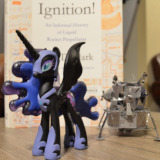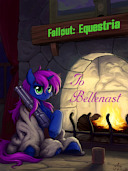Separation of Character, Reader, and Author Knowledge: How It Can Affect A Story · 5:47pm Jul 1st, 2023
Minor spoilers for To Bellenast in this one, but I urge you to read, anyway, even if you want to avoid spoilers. This is less a breakdown of the blog title subject and more an anecdote and cautionary tale of my experience with it.
If you’ve read To Bellenast, then you probably noticed early on in the story that there is almost no internal monologue. If you aren’t familiar with that term: Internal monologue is a character’s thoughts as presented in the narration of a story; this can include such things as a character asking themselves such questions as Will I make it in time? and a stream-of-consciousness description of their thought process during an action, among many other variations.
Internal monologue serves to show the reader a glimpse of what a character is thinking at a given moment, to provide insight and rationale for actions or motivations, or to present direct questions the character asks themselves when they experience something puzzling or uncertain, or when they experience doubt, emotional turmoil, or curiosity, among many other things.
It can be an invaluable tool for an author who wants to show readers what is going on in a character’s head.
Crystal Dew doesn’t really do any of that; or at least, she doesn’t do it much. The narration style I’ve used is largely devoid of those questions and explanations. Her diary entries in Chapters 3 and 5 technically aren’t internal monologue, but they do provide some insight into her thought process; the brief breaks from her perspective in Chapters 4 and 12 provide crucial plot details without which later events would seem woefully unexplained. Were that not necessary, the story would remain locked behind Crystal’s eyeballs the entire time.
The one time thus far that Crystal does have a moment of serious internal monologue is at the beginning of Chapter 12.
Crystal’s narrative is hyper-focused on her direct actions, reactions, observations, personal drive, and her interactions and relationships with other characters, primarily with Night Cloud and Blitz, and secondarily with Eagle, Zephyr, Ivy, Carbide, Maximillian, and others. Chapter 3 focuses almost entirely on Blitz and how she forms a bond with Crystal; Chapter 4 focuses on Night Cloud, 5 jumps between snapshots of the journey, 6 is all about Night Cloud and Crystal and exploring their pasts.
Chapter 6 is the most in-depth exploration of character history up to that point in the narrative, for both Night Cloud and Crystal, and it is arguably the most important part of the middle of the story. It cements that Night Cloud is serious about having a relationship with Crystal, which is obviously an important thing for Crystal, but it also shows some details about Night Cloud’s life before she came to Bellenast. If that entire chapter seemed like one big exposition dump... well, that’s probably because it sort of is, but I hope that the character stories through which it is told are engaging enough to have held your attention.
I promise I’m building up to a point, here.
Night Cloud explains to Crystal in Chapter 6 that her tribe banished her pretty much 99% because of her sexuality. Her tribe, or at least her particular village within her tribe, are... not the nicest people in that regard. Night Cloud had a couple other reasons for wanting to journey the better part of a thousand kilometers east to find Bellenast, but that was the biggest one. Their traditions were kind of horrible, and she didn’t realize it because it was all she knew. She went to Bellenast to start a new life, and maybe, just maybe, find someone to love. She was focused more on completing a general education and her studies to become a physician, however, than she was focused on finding a date.
This information, I gave directly to you, the reader, about the characters. Crystal, the narrator, hears Night Cloud say it, so both the characters and the reader know it, are directly aware of it as it is presented.
This excerpt from Chapter 10 is what Eagle says to Night Cloud on the subject of her relationship with Crystal, and how that relationship might be perceived by potential observers in Bellenast.
“Also… look, this is the last discussion I thought I’d be having today, but while I have the chance… I never listened to my parents, so I’d be a colossal hypocrite if I told you what they told me. I’m just going to say… respect each other’s wishes, and boundaries, be honest with each other, and, uh… be discreet, because… while Zephyr and I don’t have a problem with this, as long as it’s what both of you want, some ponies will, and they’ll look for any excuse to cause you grief. Somehow, I doubt Bellenast is any more forward-thinking than Cloud Loft, when it comes to… choices, and whom they involve.”
“Not especially,” said Night Cloud; she rubbed her forehoof along my neck and let out a weary sigh. “More open-minded than my tribe, at any rate. Incidentally… thank you, Eagle, for your blessing. Perhaps that’s old-fashioned, but… I’m grateful.”
The purpose of this exchange is to convey that Eagle wants Night Cloud to be prepared for the scrutiny that she will receive because she, an adult, has a romantic relationship with Crystal, who is very much a minor.
Can you see the problem? Can you see the disparity between what I claim to have meant and what I wrote?
What Eagle says above, and what Night Cloud says in response, don’t convey what I meant for those things to convey at all. It looks like Eagle is saying that Cloud Loft and Bellenast both are full of homophobic jerks, and Night Cloud is saying that they are better than her tribe. That is the complete opposite of what I intended, and I didn’t realize this until almost three years after I published that chapter.
The reason for this utter reversal of meaning is that I forgot a crucial detail of Eagle and Zephyr’s backstory. Rather, I forgot that you, the reader, did not have that information because there was no reason to tell it in the story. Crystal has lived with Eagle and Zephyr for more than a year. She knows them, she loves them, she’s familiar with their habits and behaviors, and so, in this hyper-focused narrative almost wholly devoid of inner monologue, there is no compelling reason for Crystal to describe these details, since nobody ever asks her about it. There is no description of Eagle’s or Zephyr’s cutie marks in To Bellenast because Crystal has seen them almost every day from the day she met them; there is no narrative reason for her to describe them, and no reason for her to look at them. She knows what they look like. Why would she need to say that out loud?
That is my rationale for never describing to the reader what Eagle’s or Zephyr’s cutie marks are: Crystal has no reason to pay attention to them or describe them, so the reader has to speculate... or you did have to speculate. If you want to continue to speculate, don’t reveal the following spoiler.
Eagle’s mark is a toroidal coil of copper wire, and it appeared when he learned how electrical transformers function. Zephyr’s mark is a sculpted clay bust of a pegasus mare’s head and mane, and it appeared when she first cut and styled her own mane.
This is also why Crystal has not told you, the reader, that Eagle is about 27-28 years old, that Zephyr is about 22-23 years old (substitute your head-canon equivalent for that age range if you are so inclined), that they have been together since Zephyr was 16, that Eagle faced numerous false, baseless, and scandalous accusations about their relationship for the first few years of that relationship, and that he sees himself and Zephyr reflected in Night Cloud and Crystal.
Eagle wants Night Cloud to know that she almost certainly will face those same accusations, no matter that she has never done anything to hurt Crystal, never would hurt her or take advantage of her, and would do everything in her power to protect her, and I thought that what I had written conveyed that.
I am an absolute moron. I chose to limit myself to this absurd, ultra-limited narrative perspective for 99% of the story, and because of that, the critical context needed to understand what Eagle said was wholly absent.
I have amended that conversation so that Eagle’s actual meaning is clear and Night Cloud’s response is appropriate:
“Look, this is the last discussion I thought I’d be having today, but while I have the chance… I never listened to my parents, so I’d be a colossal hypocrite if I told you what they told me. I’m just going to say… respect each other’s wishes, and boundaries, be honest with each other, and, uh… be discreet, because… although Zephyr and I don’t have a problem with this, as long as it’s what both of you want, some ponies will. They’ll…” Eagle dipped his helmet, and a soft sigh came through his speakers. “Night Cloud, this is really more for you, but you both need to hear it: They’ll see a twenty-year-old mare and a fourteen-year-old filly together… and they’ll assume the worst. They won’t know you, they won’t know what you’ve been through together, what you’ve done for each other… and even if they did, they wouldn’t care. They wouldn’t care that you’ve both fought and bled to protect each other, they’d just look at you funny and think they need to step in and pull the kid away... even when the kid isn’t really a kid anymore. They can’t see that. They never will. I just… I want you to be prepared for that. Somehow, I doubt Bellenast is any more lenient than Cloud Loft, when it comes to… choices, and whom they involve.”
“Not especially,” said Night Cloud; she rubbed her forehoof along my neck and let out a weary sigh. “More open-minded than my tribe, in some ways, less so in others. Thank you, Eagle, for your blessing. Perhaps that’s old-fashioned, but… I’m grateful. I appreciate the warning.”
That’s much clearer, isn’t it? I think so.
To make a neat book-end to this tale of oversight, I say this:
If you write a story, then...
1. Know what your characters know.
2. Know what your audience needs to know.
3. Know what you must know, but remember that your audience might need to know it, too.
Here’s a bun I saw when I took a short walk this morning.
If my silly romance-adventure-drama Fallout: Equestria story can’t make you smile, maybe a cute bun will.



